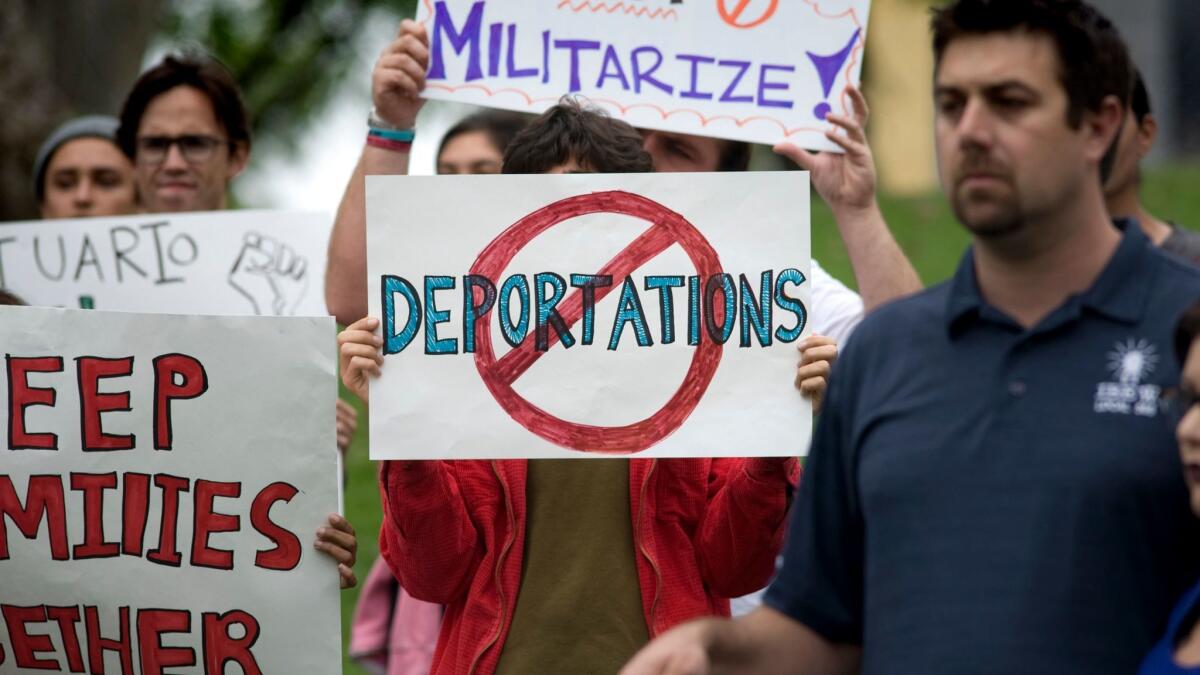Op-Ed: Immigration agents came for our student

On the morning of May 18, Cal State Los Angeles student Claudia Rueda disappeared in East L.A. The 22-year-old immigrant rights activist stepped outside her aunt’s home to move her mother’s car for street cleaning, but never returned. Hours later her family learned that she had been surrounded by three unmarked cars carrying an estimated nine plainclothes Customs and Border Protection officers who whisked her off to a detention center 130 miles away.
Claudia is a Latin American Studies major at Cal State L.A., where we are faculty. At the time of her arrest, Claudia was enrolled in one of our courses on U.S. immigration policy that studied the effects of deportation on families and communities. This subject was not just academic for her; it hit close to the bone. Once in class she asked, “Why aren’t more people advocating for immigrant rights, or against the further creation of illegality, when populations of children and parents across borders are suffering due to U.S. policies?” Though she is eligible for the Deferred Action for Childhood Arrivals program, which would protect her from deportation, her family could not afford the $500 application fee. Claudia worried constantly that she or one of her family members would be deported from the country where they have lived for more than 15 years.
In late April, it seemed that Claudia’s worst fears were realized when her mother, Teresa Vidal-Jaime, was swept up in a drug raid by a joint task force of the CBP and the L.A. County sheriff at the apartment complex where they lived. Although Vidal-Jaime was not charged with a crime, she was detained by immigration officials for overstaying her visa. Vidal-Jaime was released by an immigration court on $2,000 bond, thanks in part to a high-profile campaign led by the Los Angeles Immigrant Youth Coalition, of which Claudia is a member.
Although none had a criminal record, four were deported to Tijuana within 24 hours without seeing a judge or a lawyer.
Less than a week later, the CBP returned to East L.A. looking for Claudia. Residents reported that dozens of CBP agents knocked on doors at her former apartment building and at her aunt’s nearby home asking for information about Claudia’s whereabouts and even followed her neighbors for miles on their way to work to question, and in some cases arrest, them. In total, the CBP arrested seven community members that day, including Claudia and several residents from her former apartment building. Although none had a criminal record, four were deported to Tijuana within 24 hours without seeing a judge or a lawyer, and the rest are detained and in danger of deportation. The CBP claims that these arrests were part of a “criminal investigation,” but has not produced any evidence that connects Claudia or the others to any crime.
Claudia is the face of immigration enforcement under the Trump administration. Under current executive guidelines, any immigrant suspected of a crime, even if never arrested, charged, or convicted, has become a priority for deportation. Basic due process, such as the right to know the charges and evidence against you, is absent in the immigration system. This policy has led to a 32% increase in immigrant detentions in the first three months of Trump’s presidency compared with the same time last year, and a 100% increase in the detention of people with no criminal record or with only minor traffic infractions. ”Criminal investigations” serve as a pretext for a policy of mass deportation of immigrants who have deep ties in local communities.
Trump recently claimed, “We are not after the Dreamers. We are after the criminals.” However, data show a 25% increase in the deportation of Dreamers, as DACA recipients are known, in the first three months of Trump’s presidency, compared with the same time last year. Immigrant youth who encounter the police are more likely to have their DACA status revoked and be detained by U.S. Immigration and Customs Enforcement.
Claudia’s case also illuminates the government’s apparent practice of going after undocumented activists who challenge its immigration policies. Claudia’s detention less than one week after her mother was released seems like payback by the CBP for her activism and leadership. She is one of several youth activists since Trump’s inauguration who have been targeted by immigration agencies in what seems to be an attempt to silence them.
In March, undercover ICE agents in Vermont arrested three prominent undocumented activists associated with the group Migrant Justice, all of them under 25. In that same month, ICE agents in Mississippi detained 22-year-old DACA recipient Daniela Vargas after she spoke at a rally calling on the Trump administration to establish a path to citizenship for immigrants.
Those concerned about creeping authoritarianism in U.S. governance should be deeply troubled by Claudia’s experience. After four weeks in detention without seeing a judge, Claudia will finally have a bond hearing on Friday. ICE can and should exercise its discretion to release her immediately and process her application for DACA. State and local politicians who promised to create sanctuaries for residents like Claudia need to ensure that local law enforcement agencies are not using valuable public resources to sow fear by collaborating with immigration enforcement efforts.
Beth Baker is professor of anthropology and Alejandra Marchevsky is professor of liberal studies and women’s, gender and sexuality studies at Cal State Los Angeles.
To read the article in Spanish, click here
Follow the Opinion section on Twitter @latimesopinion or Facebook
MORE FROM OPINION
Actually, hate speech is protected speech
In a credibility contest with Trump, James Comey is the obvious winner
Talking with Comey, Trump focused on himself, not Russian hacks
More to Read
A cure for the common opinion
Get thought-provoking perspectives with our weekly newsletter.
You may occasionally receive promotional content from the Los Angeles Times.










